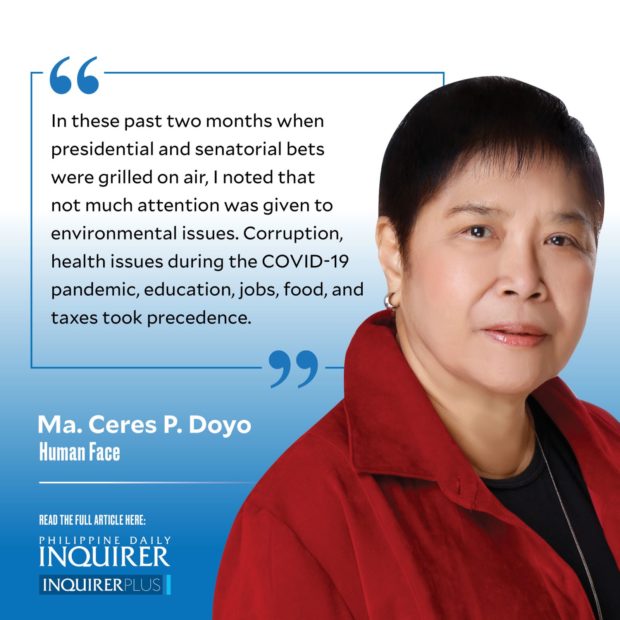How green is your president?

I am not mistaken when I say that of all the forerunners in the presidential race, Vice President Leni Robredo (VPL) is the one who has seen up close devastation around the country brought about by climate change and environmental degradation. And during her visits to bring relief and initiate revival and restoration, she has experienced up close the effects of these calamities on the lives and livelihoods of communities.
These despite her having been unceremoniously shooed out of the administration of the incumbent misogynist president, belittled and God knows what else. But like the empowered woman that she is, VPL simply soldiered on and found ways to be a balm to people’s wounds and give hope to the forgotten and forlorn. Her efforts have quietly attracted supporters and given rise to volunteerism long before she made her job application to be president of this country.
But even before she was elected vice president, VPL, as a pro bono lawyer and later representative of her district in Camarines Sur, had already served those who live in the fringes and margins. As the wife of the late Naga City mayor and later Secretary of the Interior and Local Government Jesse Robredo who died in a plane crash, she had a front seat view of what was happening on the ground.
During the 2010 presidential campaign that resulted in the election of Benigno C. Aquino III, there were no debates and Q&As aired on TV like we have now, but the Green Electoral Initiative (GEI) was able to compel the candidates to articulate their green agenda, not on air but on paper with their signatures affixed.
Issues covered were climate change, solid waste, chemical pollution, consumer safety, sustainable agriculture, genetically engineered crops, water, forests, nuclear power, and mining. Even billboards from hell were tackled. The presidential bets also had to present their environmental track record, plus their answers to two important questions:
If elected president, what would be your first environmental act during your first 100 days in office?
What qualities would you want your environmental secretary to have?
In these past two months when presidential and senatorial bets were grilled on air, I noted that not much attention was given to environmental issues. Corruption, health issues during the COVID-19 pandemic, education, jobs, food, and taxes took precedence.
I present here the highlights of the 2010 GEI survey that could provide insight to voters and candidates alike regarding environmental issues that continue to challenge us. (I have removed the names of the candidates-respondents.) Have the issues been addressed? Have promises been fulfilled? Where are we compared to 12 years ago?
All favored the phaseout of coal power and support the increasing share of renewable energy (geothermal, wind, solar, etc.) in the country’s energy mix.
All supported the full-scale implementation of the Ecological Solid Waste Management Act or Republic Act No. 9003, as well as a ban on single-use plastic bags.
Five supported a ban on field trials and the commercialization of genetically engineered crops. Two proposed more studies.
All were against the importation of genetically engineered food crops into the country.
All supported the position of the Department of Health to stop the aerial spraying of agrochemicals in banana plantations.
All were for the establishment of national targets to progressively reduce the amount of chemical pesticides and fertilizers in agriculture.
All were in favor of amending the Clean Water Act to incorporate a framework of zero discharge of hazardous chemicals from factories and domestic sources.
All supported the imposition of a total commercial log ban in the remaining forest areas.
With the exception of one, all respondents were against the proposed recommissioning of the Bataan Nuclear Power Plant. Some were opposed to nuclear power as an option, while others saw the need for more studies based on the experience of other countries and the opinions of experts.
All expressed support for an alternative mining code, which seeks to revise the current framework of the mining industry.
Most candidates opposed the proliferation of huge billboards and all expressed the need to regulate them.
All saw anti-smoke belching as a priority, with one committing to solve the problem during his first 100 days, and another vowing to go out to the streets with emission tester in hand and stop violators himself.
Send feedback to cerespd@gmail.com
Read more: https://opinion.inquirer.net/151638/how-green-is-your-president#ixzz7sDS8A3CS
Follow us: @inquirerdotnet on Twitter | inquirerdotnet on Facebook







